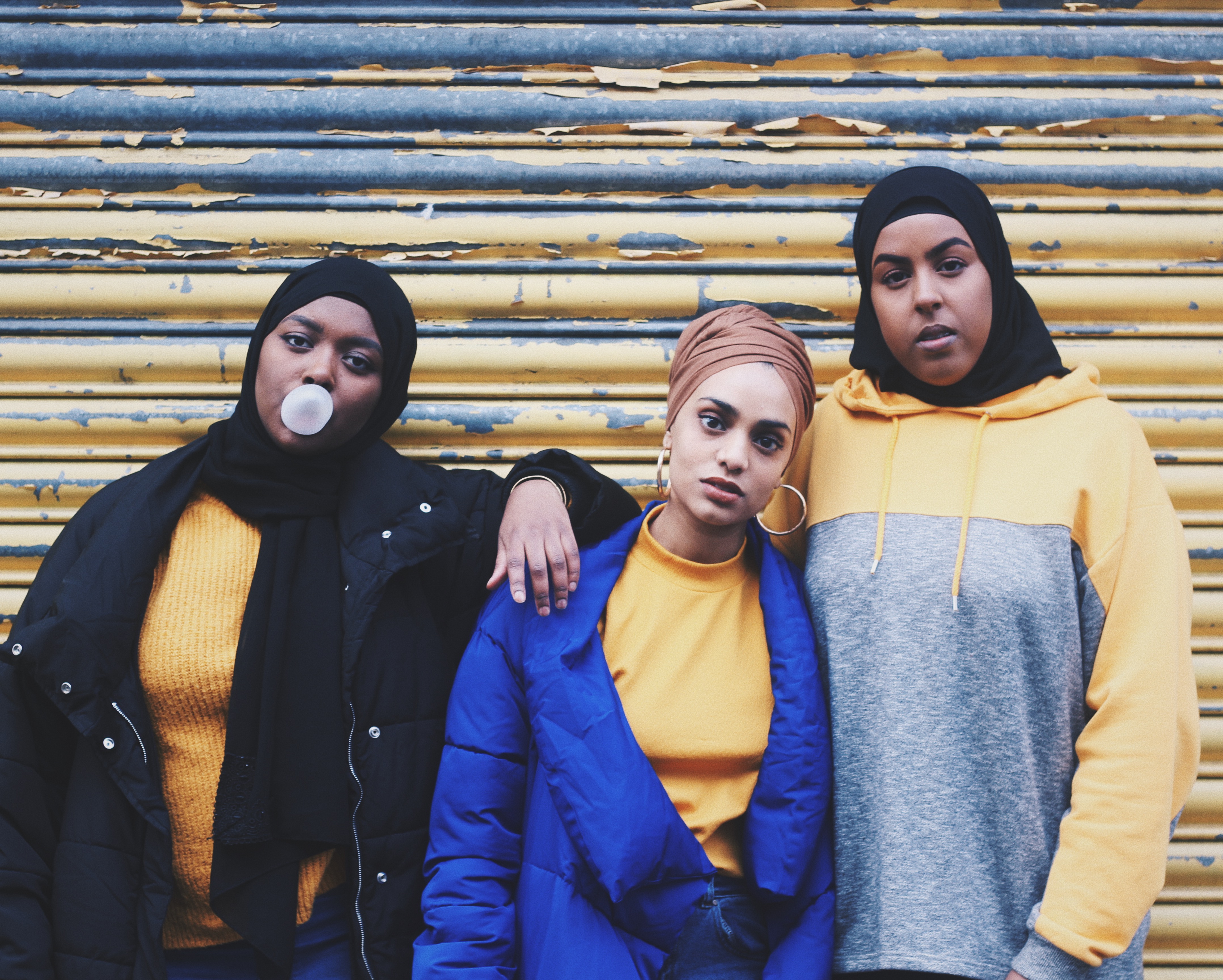
Meet Muslim Sisterhood, the collective exploring Muslim womanhood in London
Storm Thompson
14 May 2018
When was the last time you saw a photo series dedicated to the representation of everyday young Muslim women around London? If you can’t remember, then it’s probably due to the absolute lack of sustainable visibility the media gives to Muslim womanhood. Photographer Lamisa Khan co-founded Muslim Sisterhood with artists Zeinab Saleh and Sara Gulamali to help fill this gap, for good. The London-based collective have chosen authentic, genuine diversity over the usual tokenism that we witness everyday.
When you’re constantly told to “whiten up” or that “brown is ugly” it can often lead to unhealthy self-fulfilling prophecies and Muslim Sisterhood seeks to dismantle these damaging social constructs. This creative project goes beyond celebrating the beauty of Muslim women to include the celebration of People of Colour (PoC)-owned businesses. Through their images, Muslim Sisterhood wants to stamp out gentrification and give PoC businessowners the recognition they deserve.
gal-dem: How did you all get to know each other?
Lamisa (Muslim Sisterhood) : I reached out to Zeinab on Instagram because I really admired her work, I liked that it was influenced by her faith and her culture. Then she did a takeover with Sara, and they were in Adidas tracksuits and sliders and I thought, this is it, it’s a vision. I had this idea for ages but because I had no peers from my background I didn’t know how to go about it. Also, a lot of Muslim people grow up in quite poor deprived parts of London. Almost half of the British Muslim population make up 10% of those living in poverty. So it’s about reclaiming that working-class poor culture that’s been taken by the mainstream.
Zeinab Saleh (Muslim Sisterhood): Yeah I think working-class culture has been appropriated by a lot of mainstream brands recently and popular culture, music videos etc, so it’s reclaiming how we are perceived and who’s representing us as well.
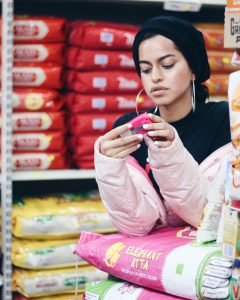
Sara Gulamali (Muslim Sisterhood): From time to time you see Muslim women being part of campaigns and doing ‘bits’. But these ’bits’ they’re doing are organised by big institutions or by white companies who are just finding token Muslims to show a ‘diverse’ campaign.
Lamisa: It’s this new age of Muslim bloggers who all fit a similar aesthetic and I never associated myself with that, I wear black everyday, nobody has got time to be layering nude on nude. Its this high-glam, chic, ‘we are so western’, ‘we are so modern’, look and I don’t fit into that. We didn’t grow up like that.
Sara: We wanted to create something authentic.
Zeinab: We especially wanted to make sure that our photo series included multiple Muslims, different Muslims.
[adsanity id=”39708″ align=”aligncenter”/]
Why do you believe it’s so important to represent a whole spectrum of Muslims?
Zeinab: It’s so important because a lot of the time when the media refer to ‘all Muslim women’ it is usually just dominated by South Asians.
Sara: Or very light skinned or even white models.
Lamisa: And it’s a shame because we come in so many different shapes and shades.
Zeinab: Yeah for example, Somali Muslim girls are so buff so why aren’t they given as much attention as other girls?
Lamisa: And we are living in a generation where our communities have become cultural melting pots. Our Muslim friends are from all over the world, and there is a lot of anti-blackness within the Muslim community as well.
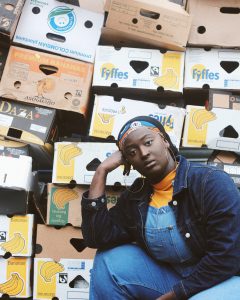
Would you argue that issues surrounding anti-blackness are overlooked in the media?
Lamisa: I think the issue often gets neglected because the mainstream media decides to focus on other issues within our community and it doesn’t really give us a chance to tackle it in a positive way. This is why we really wanted to represent all types of Muslim women.
Zeinab: For me, it’s important that it’s about the multiplicities in all of our identities among the sisterhood. My best friends are a perfect example: Ope is Nigerian, Shahima is Bengali and Thamarat is Kenyan. Going to Ope’s house and seeing how she practices Islam and being around all these different women from different ethnic backgrounds that are all Muslim provides me with a sense of community and I love embracing the differences between us.
Lamisa: In contrast, I grew up in a fairly white working-class area and felt like I didn’t quite fit in with PoC, or with white people either. As a consequence I really struggled with my Muslim identity and the only Muslim friends I had were boys, which is probably why I dress like a Muslim boy! I struggled to find that sisterhood and it was really hard for me to kind of bring everything together. It wasn’t until I was much older when platforms like Amaliah, gal-dem, and even Instagram allowed me to connect with so many Muslim women in a positive way.
Sara: I only had one Muslim friend. Before Instagram and before I started finding communities online, that was my idea of sisterhood. Then we started doing this project and reaching out to other Muslim girls, and that’s how I met loads of other Muslims, and it’s so great now to have a community of people like that!
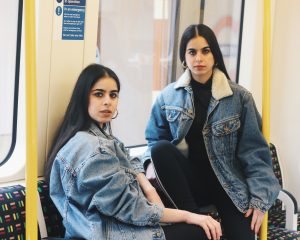
Have you thought about throwing Muslim Sisterhood exhibitions or parties?
Lamisa: We’re in the process of planning an exhibition, although nothing is set in stone yet. We were part of an exhibition at the London School of Economics called We Are Here. The exhibition was curated with the intention of creating a space for BME women in Britain to give them the space and opportunity to show their work and have their voices heard. For me, it was a big deal because I study at LSE and it has a predominantly white-washed curriculum. I found it really stressful and I really struggled with my identity while I was at university because there was just things that I didn’t feel like I fitted into. For example, I didn’t go out drinking, I wasn’t allowed to go clubbing, you know those internal struggles like ‘I’m not cool enough’.
Sara: And that’s where most of the socialising happens at university, people go to the bar but you to have to say ‘listen, I don’t drink’. On my course, we’ve had open studios before and people would leave beer cans on my work. Especially work that was religious based I’d be like ‘come on now’ because it’s just so taxing to always have to keep explaining to people why this is a ‘thing’. It’s a bit disrespectful and maybe something people should be more self-aware about. When you feel completely comfortable in a space of course you’re not self-aware because that space is made for you! But I’m constantly self aware about who I am and where I am because the spaces are not made for me.
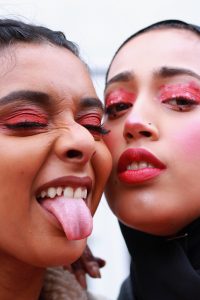
Zeinab: The exhibition We Are Here was such a great space it was like an alternative to the red wine stereotypical gallery space. Instead they had Lebanese food! Everyone’s work was just great, there was nothing mediocre. So I’m interested in creating more spaces like that which don’t alienate people.
Sara: It wasn’t even in your typical gallery space either! It was in LSE library against a glass wall. It didn’t look like anything fancy but it was the meaning behind it and I think that when you walk into any academic institution, in the UK especially, places like LSE, King’s College and UCL they are very white-washed and that goes for their staff, their students and the things that they’re teaching – so to see such unapologetically ethnic and quite political work on show was really beautiful.
Zeinab: Imagine anyone walking into the library and seeing a picture or painting of Muslim women? Because once you step outside these institutions it’s like really weird because everyone walking down the street is is in their own bubble.
Lamisa: They’re like microcosms. They exist within themselves.
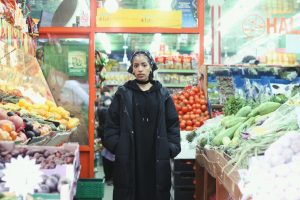
The Muslim Sisterhood project has focused a lot on businesses owned by PoC, why is this important to you?
Lamisa: The reason why we shot in PoC businesses is to celebrate them and when you look at places like Brixton, Peckham and east London, when I was growing up I used to hate going to east London with my dad every weekend to send money back home – that was the longest trek of my life and I used to hate seeing that everyone was brown and I was like ’OMG this is so gross’ because I was so insecure.
Sara: It’s so dangerous because when you’re constantly told to ‘whiten up’ or that ‘being brown is ugly’, you’re told these kind of things then you start believing it. Even stupid things, like when I used to play barbie games on the computer I would always make my barbie white, and I don’t know why I did that.
Lamisa: Now you look at places like Brick Lane and you look at places like Brixton Market, the businesses that have been there for decades are getting pushed out because of gentrification. They are so integral to our upbringing. It’s like where we buy our hair oils, where we get our prayer gear, where we get our food as well – halal meat is such a big part of the way we live.
Zeinab: I think we take it for granted in London.
Lamisa: And it was just nice to go back to these places that we used to go with our parents and not really notice or appreciate them. But I think that there’s something really beautiful about it as well.
Zeinab: We also made a conscious decision to shoot in places that we felt comfortable.
Sara: Where we didn’t have to feel like we were saying ’sorry’.
Zeinab: Most of the time we shot people they were so nice and very welcoming.
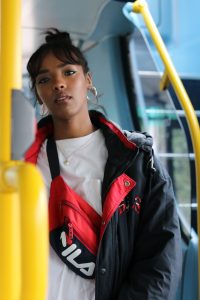
Do you think this project is going to help change how wider society views Muslim women?
Lamisa: I think for us we never really intended it for wider society. Even when we pitched it to places initially we were very specific that we wanted it on BME platforms and Muslim platforms and we made that decision from the start.
Is that why you turned down Metro Online when they approached you?
Zeinab: Yeah, because of the kind of the things you see on Metro Online. I think a lot of the right-wing press presents Muslims in a bad way so it’s just about being more skeptical about how you are going to present our photography project.
Lamisa: We didn’t create it for the white gaze, we were creating it for ourselves, for the sisterhood.
Sara: We want young Muslim girls to look at us on Instagram and feel proud to be Muslim.
Zeinab: We want them to see how beautiful and unapologetic they are whether they wear a scarf or not.
Lamisa: But the fact they identify as Muslim and aren’t afraid of saying yeah “I’m Muslim”.
Zeinab: Its really hard to be a Muslim woman in this day and age.
And what’s the hardest thing about being a Muslim woman in this day and age?
Zeinab: Islamophobia. There is so much of it – you see it creep up in daily conversations sometimes and you see it in the headlines. Every time I’m on Twitter there’s always something linked to it.
Sara: It’s scary, even that shit about ‘Punish a Muslim day’.
Zeinab: My mum was so shook as well.
Sara: My dad was so scared. He honestly said ‘don’t go out’.
Lamisa: Even with the Hijab ban in schools it’s like everything we do is under so much scrutiny. So what, a girl wants to wear her Hijab.
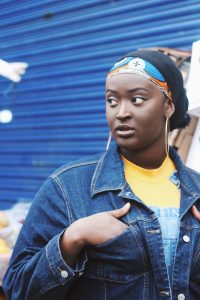
This project focuses on Muslim womanhood in London, do you have any plans to extend the project to represent women from all over the country?
Sara: When we started the project we felt like we needed to be authentic to where we grew up, so we started the project in London. We knew the places, we knew what to look for, it’s our space.
Lamisa: Sara and I grew up in west London and Zeinab grew up in east. Doing the project here in London is like filling the voice I didn’t have growing up. But I think it would be really nice if we could branch out, but also logistically it’s impractical at the moment.
How have people responded to the photo series, have you had any negative criticisms?
Lamisa: Alhamdulillah, we have only had positive feedback and hopefully it stays that way.
Zeinab: We are under scrutiny all the time, so to see anything negative about any of our modes would break my heart and that’s the reason why we didn’t want to work with certain publications.
Sara: There’s always gonna be haters.
Lamisa: But thank God we haven’t been exposed to them yet.









